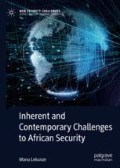Abstract
This chapter focuses on the political economy (actual competition over resources, on an individual and group level). It investigates the economic resources available to African states against the need. It is argued that for various reasons, the resources and opportunity to pursue and meet needs are not available for many Africans. With the scarcity of resources, competition is thus a natural progression, and it is fierce. Where cooperation fails, violence becomes an option, hence the high levels of civil conflict. This competition allows for ethnic manipulations, as discussed in Chap. 3. The damages caused by competition for resources further exacerbate the problems of governance addressed in Chap. 4.
Access this chapter
Tax calculation will be finalised at checkout
Purchases are for personal use only
References
African Union. 2019. AfCFTA Agreement Secures Minimum Threshold of 22 Ratification as Sierra Leone and the Saharawi Republic Deposit Instruments. April 29. https://au.int/en/pressreleases/20190429/afcfta-agreement-secures-minimum-threshold-22-ratification-sierra-leone-and. Accessed 25 June 2019.
Alexander, J. 2001. Islam, Archaeology and Slavery in Africa. World Archaeology 33: 44–60.
Amin, Samir. 2014. Understanding the Political Economy of Contemporary Africa. Africa Development 39 (1): 15–36.
Blomberg, Brock, and Gregory Hess. 2002. The Temporal Links Between Conflict and Economic Activity. Journal of Conflict Resolution 46 (1): 74–90.
Buzan, Barry. 1991. People, States and Fear: An Agenda for Security Analysis in the Post-Cold War Era. 2nd ed. London: Wheatsheaf.
Callimachi, Rukmini. 2019. ISIS, After Laying Groundwork, Gains Toehold in Congo. 20 April. https://www.nytimes.com/2019/04/20/world/africa/isis-attack-congo.html. Accessed 2 July 2019.
Carney, Timothy. 2005. The Sudan: Political Islam and Terrorism. In Battling Terrorism in the Horn of Africa, ed. Robert Rotberg, 119–140. Washington, DC: Brookings Institution Press.
Collier, Paul. 2000. Rebellion as a Quasi-Criminal Activity. The Journal of Conflict Resolution 44 (6): 839–853.
———. 2007. Poverty Reduction in Africa. Proceedings of the National Academy of Sciences of the United States of America 104 (43): 16763–16768.
Collier, Paul, and Anke Hoeffler. 2002. Greed and Grievance in Civil War. March 1. http://documents.worldbank.org/curated/en/998891468762911498/Greed-and-grievance-in-civil-war. Accessed 28 June 2017.
Collier, Paul, and Nicholas Sambanis. 2002. Understanding Civil War: A New Agenda. The Journal of Conflict Resolution 46 (1): 3–12.
Ellingsen, Tanja. 2000. Colorful Community or Ethnic Witches’ Brew? Multiethnicity and Domestic Conflict During and After the Cold War. Journal of Conflict Resolution 44 (2): 228–249.
Gurr, Ted Robert. 1994. Peoples Against States: Ethnopolitical Conflict and the Changing World System. International Studies Quarterly 38: 347–377.
Hegre, Håvard, Tanja Ellingsen, Scott Gates, and Nils Petter Gleditsch. 2001. Toward a Democratic Civil Peace? Democracy, Political Change, and Civil War, 1816–1992. American Political Science Review 95 (1): 33–48.
Hendricks, Cheryl, and Naffet Keïta. 2017. Security Regimes in Africa: Prospects and Challenges. Africa Development 42 (3): 1–12.
Hirshleifer, Jack. 2000. The Macrotechnology of Conflict. The Journal of Conflict Resolution 44 (6): 773–792.
IMF. 2019. Regional Economic Outlook: Sub-Saharan Africa. Washington, DC: The International Monetary Fund.
Jones, Branwen Gruffydd. 2005. Africa and the Poverty of International Relations. Third World Quarterly 26 (6): 987–1003.
Kimenyi, Mwangi, Francis Mwega, and Njuguna Ndung’u. 2016. Kenya Economic Growth, Labor Market Dynamics, and Prospects for a Demographic Dividend. In Africa’s Lions: Growth Traps and Opportunities for Six African Economies, ed. Haroon Bhorat and Finn Tarp, 109–144. Washington, DC: Brookings Institution Press.
Lekunze, Manu. 2019. Complex Adaptive Systems, Resilience and Security in Cameroon. London: Routledge.
Levine, Paul, and Ron Smith. 2000. Arms Export Controls and Proliferation. The Journal of Conflict Resolution 44 (6): 885–895.
Lichbach, Mark. 1984. An Economic Theory of Governability: Choosing Policy and Optimizing Performance. Public Choice 44 (2): 307–337.
Mann, Simon. 2011. Cry Havoc. London: John Blake Publishing.
McGuire, Martin, and Mancur Jr Olson. 1996. The Economics of Autocracy and Majority Rule: The Invisible Hand and the Use of Force. Journal of Economic Literature 34 (1): 72–96.
Moore, Will. 1998. Repression and Dissents: Substitution, Context, and Timing. American Journal of Political Science 42 (3): 851–873.
Pillay, Devan. 2015. The Global Economic Crisis and the Africa Rising Narrative. Africa Development 40 (3): 59–75.
Pilling, David. 2018. Nigerian Economy: Why Lagos Works. March 25. https://www.ft.com/content/ff0595e4-26de-11e8-b27e-cc62a39d57a0. Accessed 26 June 2019.
Sandler, Todd. 2000. Economic Analysis of Conflict. The Journal of Conflict Resolution 44 (6): 723–729.
Shinn, David. 2016. Poverty and Terrorism in Africa: The Debate Continues. Georgetown Journal of International Affairs 17 (2): 16–22.
Stern, Maria, and Joakim Öjendal. 2010. Mapping the Security–Development Nexus: Conflict, Complexity, Cacophony, Convergence? Security Dialogue 41 (1): 5–30.
The Economist. 2018. Francophone Africa’s CFA Franc Is Under Fire. The Economist, January 27.
Wittman, Donald. 2000. The Wealth and Size of Nations. The Journal of Conflict Resolution 44 (6): 868–884.
Author information
Authors and Affiliations
Corresponding author
Rights and permissions
Copyright information
© 2020 The Author(s)
About this chapter
Cite this chapter
Lekunze, M. (2020). The Political Economy of Africa and Its Security Implications. In: Inherent and Contemporary Challenges to African Security. New Security Challenges. Palgrave Macmillan, Cham. https://doi.org/10.1007/978-3-030-26925-8_6
Download citation
DOI: https://doi.org/10.1007/978-3-030-26925-8_6
Published:
Publisher Name: Palgrave Macmillan, Cham
Print ISBN: 978-3-030-26924-1
Online ISBN: 978-3-030-26925-8
eBook Packages: Political Science and International StudiesPolitical Science and International Studies (R0)

